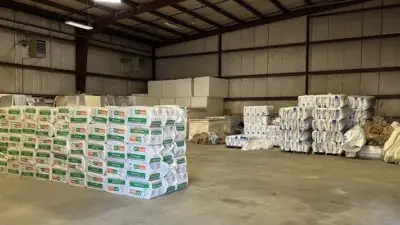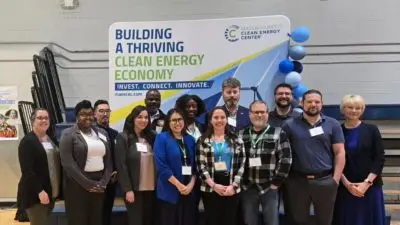The holiday season is upon us which can mean family gatherings, cooking, visitors, and more. No matter what you have planned, here are some tips for being green during a time that typically requires more home energy use than usual.
Make smart lighting choices
Make sure you have LED bulbs in your fixtures as they use up to 90% less energy than incandescent lighting and last 35-50 times longer. This is an energy switch that can save you money for years to come, not just this holiday season. While main lighting probably comes to mind, don’t forget about under-cabinet lighting, recessed downlights, bathroom vanity lighting, and more. You might be surprised at how many bulbs you have in your home, and even if you’re not ready to replace them all, replace some of your most commonly used lights to get a good start.
Want to save even more energy with lighting? Check out this blog about using advanced power strips to ensure that you aren’t wasting energy with lighting, appliances, and phone chargers while everyone is sleeping.
Choose the right holiday lights
If decorating your home’s interior or exterior with holiday lights is a tradition, check if they are LED bulbs and put them on a timer to save energy and money. Also, because LED lights are much cooler than incandescent bulbs, it reduces the chance of combustion or burnt fingers, making them safer than traditional models. They are also more resistant to breaking because they aren’t made of glass.
Consider it an investment or a gift that keeps on giving, because according to the U.S. Department of Energy (DOE), the same string of LED lights could still be working 40 holiday seasons later. They’re also easier to install; “up to 25 strings of LEDs can be connected end-to-end without overloading a wall socket,” says the U.S. DOE.
Cook efficiently in the kitchen
According to the U.S. DOE, cooking at home accounts for 4.5% of total energy use for U.S. households, and that number doesn’t even include other costs associated with home-prepped meals like refrigeration. All together the U.S. DOE says that as much as 15% of the energy used in the average U.S. home is from the kitchen.
Some tips for energy efficiency in the kitchen include keeping the oven door shut (no peeking!), using your microwave, toaster oven, or crockpot instead of the oven or stovetop, and getting rid of your wobbly pans if you use an electric range. The U.S. DOE says that “electric stovetops can only transmit heat to pans they are in direct contact with; the less contact your pan has with the burner, the more energy the stovetop will have to expend to heat the pan (and its contents).”
Set your programmable thermostat
If you have a programmable thermostat or a smart thermostat, now is its time to shine! Don’t waste energy when you’re not around, whether you’re on vacation or at a holiday dinner with friends. If you’re having guests over, utilize the settings so that it’s the perfect temperature when your guests arrive and back down to normal when you’re in bed for the night – without you having to remember! You save easily (as much as 10% per year on heating/cooling) with a programmable thermostat just by turning the temperature back 7°-10°F for 8 hours a day from its typical setting, holiday season or not!
You can get information about receiving no-cost programmable thermostats or $100 off a smart thermostat here with a quick Home Energy Assessment (at no cost to you through the Mass Save® program).
Check your laundry settings
Do you do more laundry than normal during the holiday season? Whether it’s because of the bulky winter items, more events on the calendar, or just hosting your family, your washer and dryer might be busier than normal this season. To save energy when you do laundry, follow these simple tips:
- Wash with warm water (or cold water for even more energy saved)
- Wash full loads
- Make sure your dryer loads aren’t too full or too small
- Air dry (if possible) to eliminate machine drying
- Use a lower heat setting to dry (even if it takes longer!)
- Switch wet clothes to the dryer while it’s still warm from the previous load
- Use dryer balls to reduce static and absorb moisture to cut drying time
- Utilize your cool down cycle to use leftover heat for drying
Want more details about energy-efficient laundry practices? Click here.
Think twice about how you wash your dishes
According to ENERGY STAR, an energy-efficient dishwasher costs about $35 to run every year, could save you approximately 3,870 gallons of water over the appliance’s lifetime, and uses less than one-fourth of the energy that you would use if hand washing. Using an ENERGY STAR-certified dishwasher (instead of handwashing) can cut your energy costs by $130 annually, on average.
And what about the actual time spent washing dishes by hand? It is estimated that simply putting dishes in the dishwasher, instead of hand washing, can gain you 10 days over the course of the year!
Want more ways to save water while you have guests over this season? Check out this blog for more information.
Choose carpooling when you travel
Did you know that a typical passenger vehicle emits about 4.6 metric tons of CO2 annually? According to the Environmental Protection Agency (EPA), transportation is one of the largest contributors to U.S. GHG emissions.
Whether you’re driving to dinner this holiday season, or driving out of state, carpool when you can instead of taking separate vehicles to the same place. A study from UC Berkeley reported that one individual carpooler could decrease GHG emissions by about 4%-5%. Want to take that a step further outside of the holiday season? That same study stated that employees who carpooled to and from work could potentially decrease 22%-28% of CO2 emissions.
Saving money and energy is not just for the holiday season. If you’re looking for big, yet simple, ways to lower your energy costs year-round, call (781) 305-3319 or sign up here for a Home Energy Assessment, at no cost to you. As a proud Mass Save partner, we offer assessments to Massachusetts residents so that they can learn how their home consumes and loses energy and make greener choices as a result!
We’re here to help you reduce home energy use, holiday season, or any season!








